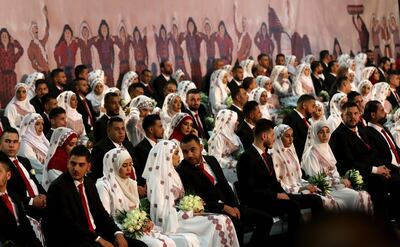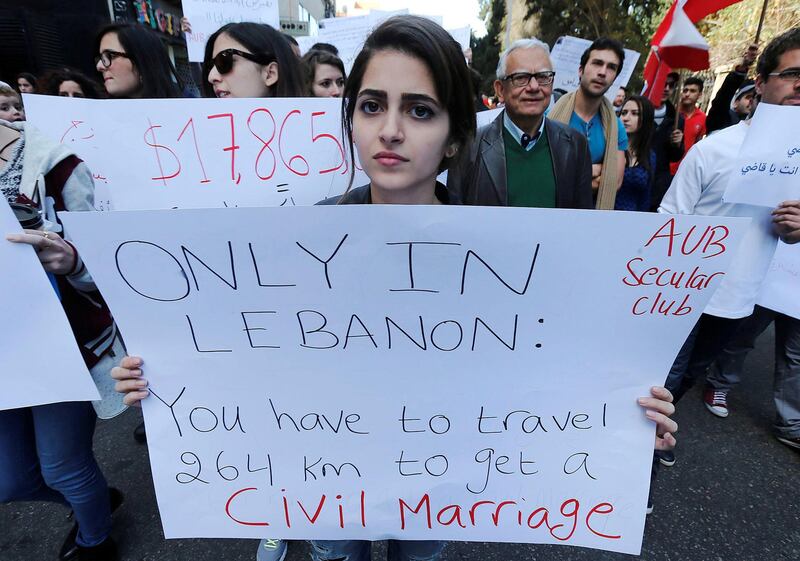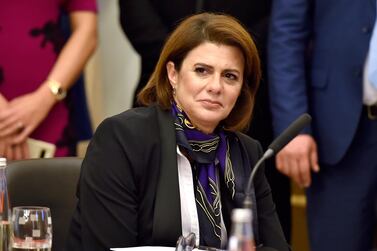Lebanese Interior Minister Raya Hassan rekindled a controversial debate over civil marriage, a decade-long argument that has pitted religious groups against civil society and politicians.
"Of course, I would personally prefer that there be a framework for civil marriage," Ms Hassan told Euronews last week. . "We know that this has sectarian and political dimensions and I will take these into consideration, but I want to open a debate with all religious parties".
As local media picked up on the interview, religious groups reacted with outrage despite some prominent politicians coming out in support of her intervention.
Like many countries in the Middle East, nonreligious marriage is not allowed in Lebanon.
There are 15 separate personal statue laws that govern the country’s major sects and each has its own unique religious court.
But there are now around a thousand couples a year travelling abroad to get civil marriages overseas.
Ms Hassan is a respected politician having previously been the first female finance minister and she has a close relationship to Prime Minister Saad Hariri, who in past has voiced his support for civil marriage. As the first female Interior Ministry, some are hoping that she will now play a key role in recognising civil marriage.
Lebanon’s highest Sunni authority, Dar Al Fatwa, published a statement on Monday to express its “absolute rejection” of the idea saying that it contradicts Islamic law.
Judge Muhamad Nokari, ex-director of Dar Al Fatwa, said that as long as Lebanon is a sectarian state, where religion plays a key role in people's lives, there is no alternative to religious ceremonies. "Civil marriage simply cannot exist within a sectarian system", he told The National.
Dar Al Fatwa has called for an end to the debate because no decision regarding civil marriage “can be taken in parliament without taking into consideration the position of Dar Al Fatwa and other religious authorities in Lebanon”.
Similarly exasperated, a spokesman for the Catholic church said: “whenever a new government is formed and a new interior minister is appointed, the topic of civil marriage is dug up again.”
Father Abdo Abou Kassem, the Catholic Church's spokesman, argued that an optional civil marriage is "wrong" and "confusing". The director of the Catholic information centre also told Lebanese news agency Akhbar al Yawm this week that "The church does not support civil marriage because it contradicts the concept of the 'sacrament of marriage'."

However, several politicians have backed Ms Hassan. “Enough with religion being used to discriminate against citizens,” Druze leader Walid Joumblatt said on Monday. “Is it possible to give your opinion about civil marriage without being accused of heresy?” he tweeted.
“Civil marriage is a right which must be freed from sectarian hands and incorporated into a legal framework”, wrote Mariam Skaff, head of the small Popular Bloc, in a statement published Tuesday.
For nearly 70 years, Lebanese politicians have debated the possibility of introducing civil marriage in Lebanon. But the religious pressure remains too strong.
The closest Lebanon ever got to adopting civil marriage was in 1998 when a draft bill, supported at the time by President Elias Hrawi and Speaker of Parliament Nabih Berri, was discussed and approved by the government. But then Prime Minister Rafic Hariri caved to pressure from religious organisations and declined to sign the draft bill.
A decade later, Mr Berri seems to have lost patience with pushing for civil marriage. “In politics, you have to know what you can get”, he said on Tuesday afternoon. “I believe there is no need now for this campaign and that while it provides a distraction, it’s not our problem right now”.
Lebanon has finally managed to form a government after nearly 9 months of political wrangling. The new cabinet has announced that its priorities are economic reform and fighting corruption.
However, activists argue that civil marriage is a pressing issue because the current personal status laws systematically discriminate against women.
A 2015 report from Human Rights Watch found that across all confessions in Lebanon, women faced “legal and other obstacles” when ending unhappy or abusive marriages. It said they face difficulty maintaining financial freedom and are at high risk of losing custody of children especially after remarrying.
“Even when couples get married abroad under civil law and the woman thinks she is protected, her husband can go to a religious court anyway if he wants to file for divorce”, Lama Fakih, deputy director of Human Rights Watch's Middle East and North Africa division, said. “What we recommend is that there be an optional personal status code that could sit alongside the religious code”.
Despite opposition, the past decade has seen a small number of domestic nonreligious weddings. Couples exploited a loophole in Lebanese law that allowed them to erase their religious affiliation from their identification documents.
Between 2009 and 2013, Interior Ministers Ziyad Baroud and then Marwan Charbel registered a little less than a dozen non-religious marriages, say activists. But the procedure was then blocked under Mrs Hassan’s predecessor, Nohad Machnouk.
This translated into an administrative nightmare for the newlyweds as their children were not then registered.
“What’s interesting with Raya Hassan’s position is that she might go back to registering civil marriages again”, says Ghassan Moukheiber, who served as MP from 2002 to 2018.
Supporters of civil marriage like Mr Moukheiber argue that religious institutions are afraid of losing control over their followers. “They don’t want to make it easy to escape their authority. It’s very hypocritical considering that civil weddings abroad are common”.
Economist Jad Chaaban has also said that the lucrative nature of weddings in Lebanon may be blocking change.
In 2013, he wrote that marriages provided more than $9 billion a year to religious institutions. “No wonder all clergies are against civil marriage!”, he tweeted on Monday.
With a divorce rate now estimated between 15 per cent and 20 per cent, the annual revenue has likely risen higher.







